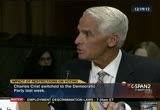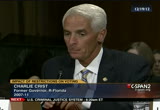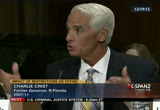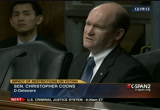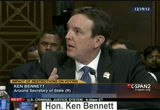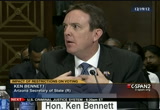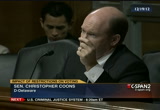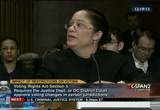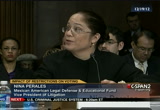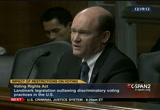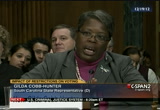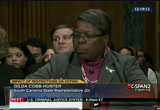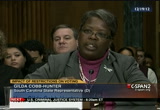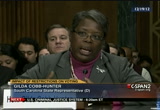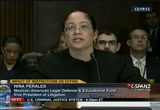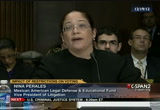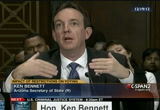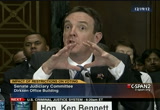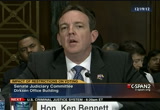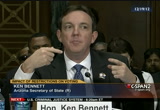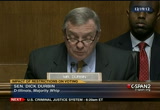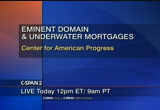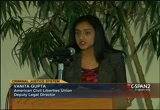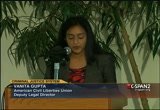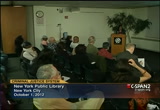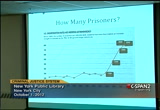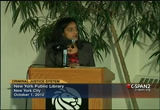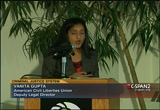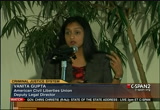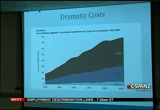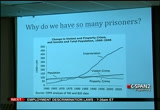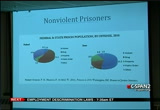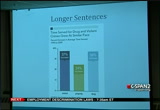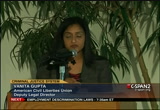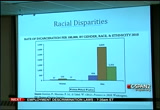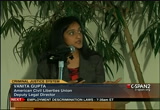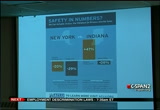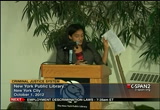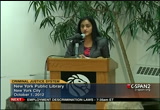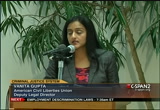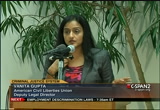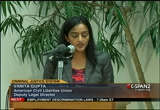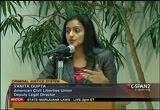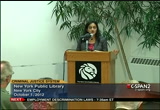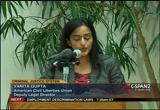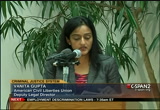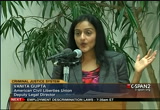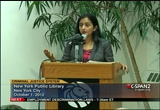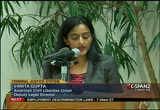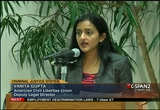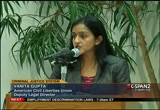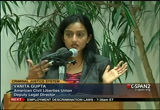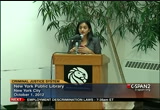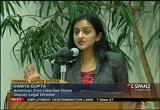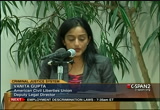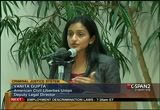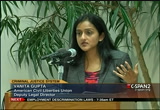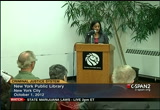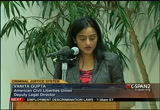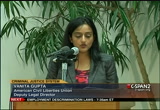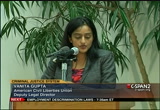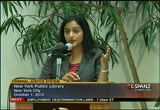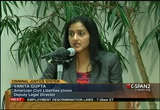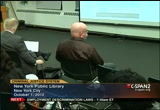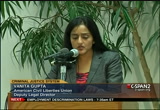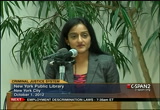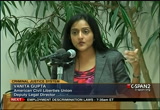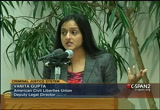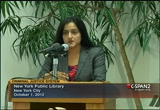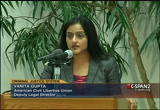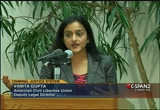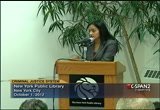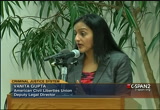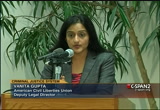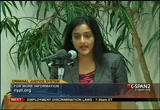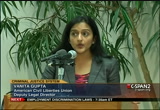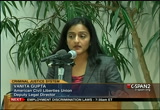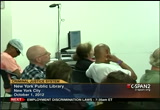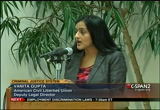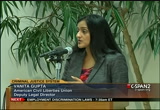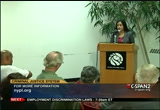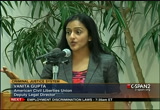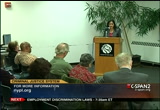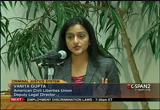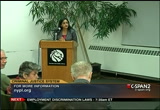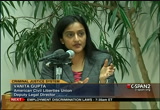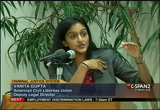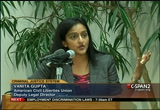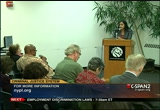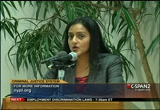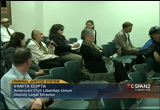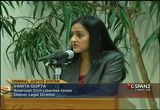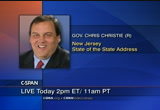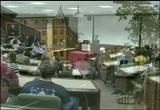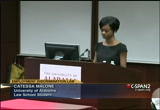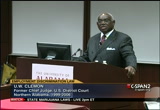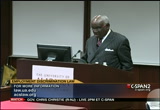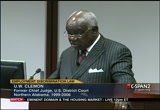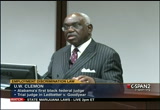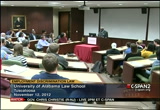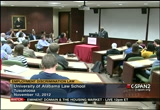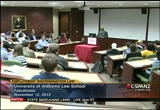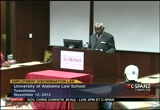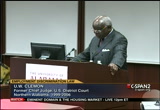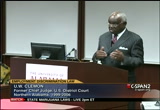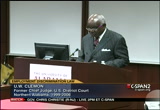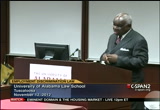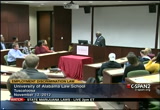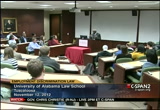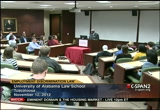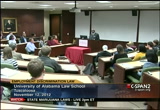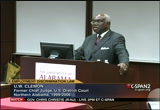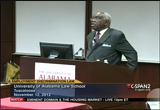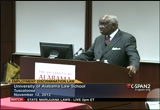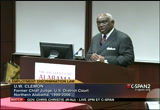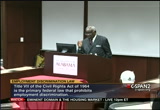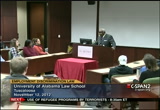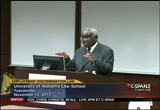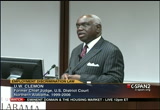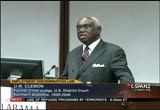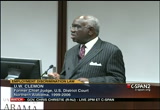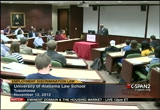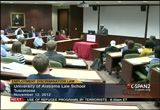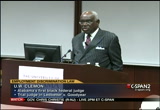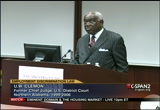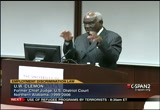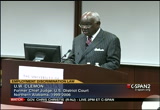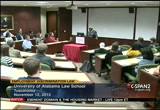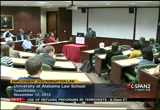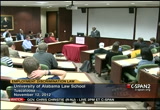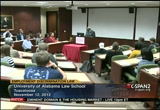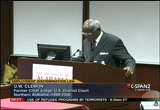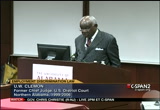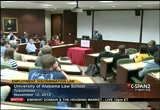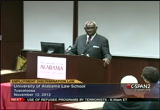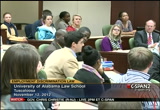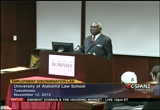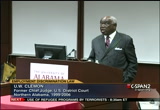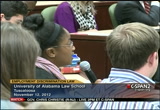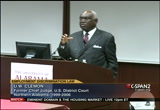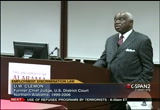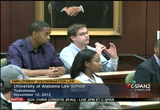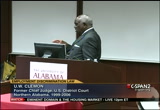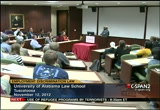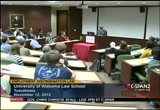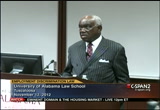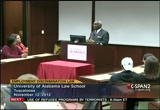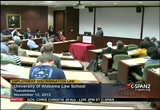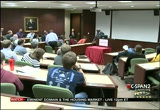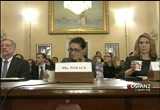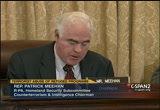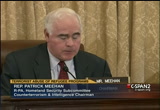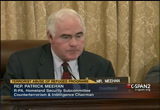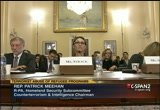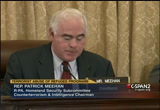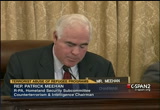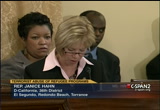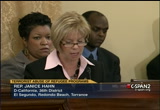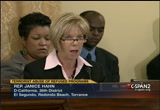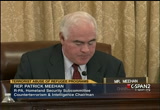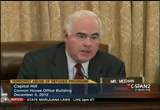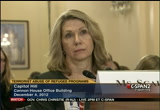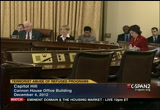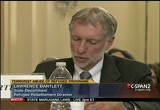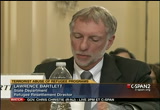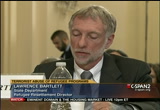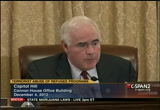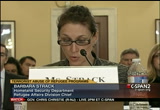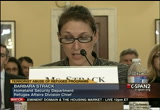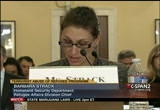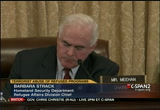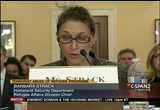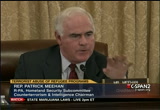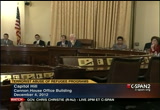tv Today in Washington CSPAN January 8, 2013 6:00am-9:00am EST
6:59 am
>> people forget. but i do think now that there is a possibility of a sustained longer-term effort to slowly start to undo the policies. and as we change policies and people understand that crime rates are not going to spike up it changes people's hearts and minds around incarceration and offers better, more productive solutions that actually do a better job of protecting our public safety. i'm committed to this work.
7:00 am
it is all the work i've ever done actually since graduating, and i think that really the moment of opportunity is now. our lives again to end the day we become silent about the things that matter. that is a quote from martin luther king, jr. out of keep on my wall, and i absolutely think that is the case. i'm very fortunate that he been able to devote my career to working on issues that i think about it. i think it matters that there is tremendous human devastation and brought out of unnecessary incarceration in this country. i think it is terrible that we treat children with such punitive measures that we have kind of created, we've adopted a whole system out of treating children like adults. that is, i don't think produces the kind of public safety outcomes that one would've hoped for your we have an ineffective system. the bottom line is that the system works, that would be one thing but with a wrist visit the rate we have we know this is not a system that works and there
7:01 am
are better ways of going about addressing some of the serious problems. sometimes public health problems and other problems that we have. so i would just like to close by saying that to me this is really, there's a tremendous opportunity. in 2011 own over 23 states implemented some form of evidence-based policy to save states money and better public safety. we've done a number of reports documenting these reforms. we are the only organization in the country that actually has an affiliate presence in every single state in the nation, and that gives us power and the legislature. we litigate in the courts. and allows us to have a broad reach in the states and for this kind of campaign to end overincarceration it is of tremendous value. we have states kind of as red as mississippi and texas, can going out to enact reforms but in 2004
7:02 am
and 2008 mississippi, for example, enacted laws that expand a parole eligibility and a limited their truth in sentencing law, placing parole restrictions on nonviolent offenders. they said you're serving a nonviolent offense you can be eligible for parole after serving 25% of your sense rather than 85% of your sins. those reform projected to save the state about $450 million between 2008-2012 and reduce its prison population growth by a very significant percentage. since 2008 mississippi's crime rate has fallen to its lowest level since 1984. kentucky is another state enacted a law that a limited pretrial attention for many drug offenses including marijuana possession, and instituted probation for drug possession have reduced sentences for -- that reform is projected to save the state $422 million by 2020 and reduce its prison population
7:03 am
growth by almost 19%. in ohio, in 2011, ohio and acted a lot about a limited crack cocaine sentencing disparity. pass a series of measured. these reforms were unthinkable when i was litigating cases 10 years earlier. and i think really the aclu has been fighting fairness in the criminal justice system for decades. we help litigate the moran the case. several seminal cases that brought us basic fundamental protections in the criminal justice system. we will continue to do this work long after the economy may become flushed. but really this is the first sustained opportunity that we have to really address the system of mass incarceration and the aws is at the forefront and fighting in states to do the. the work is urgent and i thank you all for coming here to listen to me this evening talk about this critically important issue. thank you.
7:04 am
[applause] >> does anyone have any questions in the audience? i'm supposed to wait until you have the mic. >> [inaudible] >> they present industry, it's a small percentage -- prison industry, folks who operate a prison but i think it's had a significant impact. there's money to be made at all parts of the criminal justice system. so it's not just private prison operators, which i think have created a perverse incentive for actually maintaining and keeping prisons. i'm going to just -- last year,
7:05 am
the president and ceo issued a letter to 48 governors around the country telling them that cca, private prison company, would by their prison as long as the state would guarantee a 90% full capacity. i mean, this was out brazenly, we had a lot of fun with this one but it was a serious letter from the ceo to 48 governors around the country. it wasn't, we didn't have to do a lot of investigating and digging around to understand what the link there was. there's also the commercial bail bond industry. there is a huge, huge problem, and new york is -- human rights watch did a tremendous report watching bill but there's a lot of money to be made on keeping feel in pretrial detention, people are supposed to be given the presumption of innocence and you may have been arrested for nonviolent misdemeanor offenses even and are being kept in
7:06 am
pretrial attention because their bail amount to set so high and there's whole industry dropping from it. kentucky than the commercial bail bond industry and i think there's a lot of work that the aclu has been doing to really fight off the for profit incentives that maintain bad criminal justice policies. in the same breath that we are fighting to have a data-driven policy to animate criminal justice, we need to take up the perverse incentives that allow for kind, where people are profiting from prison expansion. >> i love everything you said is wonderful. i have a question by space on what you just said. i was always under the impression that -- [inaudible] >> i think there's a lot of mixing, the private prison
7:07 am
operators are operating prisons, usually that were formerly public prisons because they bought the prison from the state. and so i don't know, tell me a little bit more about what you -- [inaudible] >> yeah, they are, they are often functions, they are subcontractors. in immigration -- 50% of immigration detention cells rely on private prison beds. and what happened, as the crime rate started to diminish, the federal government bailed out a lot of these private prison companies that were going bankrupt in around 2000, 2002, and gave them whole bunch of immigration detention contracts. and i litigated the corrections corporation of america for really inhumane treatment of immigrant children who were in a medium security prison, many of them are children of asylum seekers in this country, parenthood not committed any
7:08 am
crime, and they were subcontracted by immigration and customs enforcement. they're operating these prisons on behalf of the state. that is a huge problem for there to be private kind of operating of no, less training, in some places they try to push for cutting is to pressures from three meals to two meals a day as a way to cut corners. there's any number of risks. we did report, the aclu issued a report last year which documents the problems that we have seen with private prisons that absolutely, they are operating these prisons on behalf of the state. >> not proven until you're proven rich. [inaudible]
7:09 am
>> i was on jury duty. it takes a while. many days when you want to be outside. >> no, i think there is -- in texas, it turns out that is used the example of texas but new york has a -- harshest drug laws in the books of the country. is not entirely a southern problem. i think that we as a nation have just accommodated to punishment. we see with schoolkids in florida getting arrested, six years old for bringing scissors to school. i mean, you can't make this stuff up. it is shocking and i think there's a degree to which, i mean there's a degree to it. a lot of people look at these stats are showing their like well, we don't care. there's a lot of crime being committed in this country. one has to ask why are we so out of whack with other countries? is it that we're just a more violent society and we are committing more crimes? and yet we know in a federal
7:10 am
system only 7% of people in prison are in for violent crimes. and so it's also about judgments that we've made as a society to kind of rely on very punitive measures as a response to what are fundamentally public health problems. if you look at addiction, drug addiction or drug possession. we see this kind of across the board and i think, you know, it is a mistake to look at it geographically isolated to one part of the country. this is become a nationwide problem, but i've also say that the reforms that are coming about are happening in some of the southern states, and people are using the fact, we see commissioners a department of correction all over the country for unconstitutional conditions but the head of the department of corrections in mississippi and the warden of the louisiana state penitentiary have become champions of some of the reforms in the state legislature because they are tired of seeing the same people cycle in and out of the system who don't need to be
7:11 am
there, or certainly don't need to be there as long as they are. >> [inaudible] do you find it is the federal law enforcement driving the rogue industry? >> yes. >> and lastly, will the federal establishment be sensitive to the economic issues? >> that's an important set of questions. i don't talk about the federal system as much because they are on the opposite trajectory. so the federal system as was just mentioned is actually expanding. the bureau of prisons budget actually expanded this past year. it is going kind of counter to the direction of the states are going, and the aclu sponsored a couple of hearings on, where
7:12 am
states leaders from state that i do have enacted significant reform presented, presented the story of what happened in their state in trying to try to motivate reform in the federal system. the reality is the economic pressures facing the states don't exist in the same way as they do with the federal government. the federal government isn't getting that same pinch. state governments have to balance their budget. the federal government doesn't, and so there are fewer pressures on the federal government to actually have to deal with this as a cost-saving measure. the reality is as i think the states in this instant have a lot -- as part of the work that we're doing. we have federal lobbyists who are really kind of trotting around to conservative lawmakers on the hill saying, your own constituency, the state lawmakers, analog from your analog in the states actually enacting these reforms bring
7:13 am
them to congress. do something to reverse what's going on in the federal system. there are any number of people who talk about how really punitive our federal sentencing schemes are. people who aren't the aclu, we have people in the department of justice to talk about the need to address overly commuted sentences and there aren't the same pressures and ethical will be have to figure out how to force the federal government's hand to think much more about the fiscal impact of the laws they pass and the impact on justice. there's a bill right now pending. it's been pending for several years. senator webb, a conservative democrat has been trying to get a simple study the federal criminal justice to also look at the case system. but to really get an analysis to understand what has been fueling the federal rates of
7:14 am
overincarceration. and even just restudy there hasn't been sufficient will, but i think that we are working on it and we're going to get there, but there's some work to be done at the federal level. the momentum is just much faster and it's going in the right direction in the states. >> [inaudible] without a right to a hearing, or to a lawyer, or write to confront accusers. and with rules of evidence suspended, and no right to a lawyer afterwards, after the persons rights are compromised. is anyone looking into this violation? >> yes.
7:15 am
the aclu actually has been very active on this issue, but the united states supreme court several times ago actually issued a ruling that really limited the due process rights in civil commitments, and really look at it, contemplated it as an extension of the existing criminal sentence. and so, but it hasn't stopped the litigation but there is a lot of work that needs to be done still on civil commitment issues. and so it's kind of an ongoing project, and is in a host of different context, another talk by specific context, but this people, people civilly committed for mental because of mental illness. and there are a range of issues that the aclu has been working on with partner groups to actually address and raise the due process concerns about civil commitment.
7:16 am
>> can you explain something about the philosophy behind incarceration, and why, what is the idea behind isolating a person so acutely? >> so, aside from the campaign to end overincarceration, the aclu likes of the campaigns, but another one is a campaign to stop the use of solitary or at least significantly curb its use. we've been very active the last several years litigating to prevent long-term isolation and to create benchmarks programs, access to services for people usually your mentally ill and long-term isolation. we have found horror stories, people left in the whole as they say where guards didn't actually
7:17 am
know, hadn't been recording exactly how long this person had been in. so there's an overuse of solitary confinement and long-term isolation for disciplinary measures. simple disciplinary violations that result in people getting initially 30 days and long-term isolation, and can quickly to a year, convincingly people have become immune to do caring about this long prison sentences. people can think all well, 30 days in isolation, that actually looking at human rights standards, 30 days in isolation is actually an aberration internationally. and yet we use long-term isolation. we are not doing a foia, a 50 state foia survey that document how many people are actually in prison on any given day, a snapshot and long-term isolation, and right now the figures that we are that it's close to about 30,000 people on any given day are in long-term isolation. that means that they are in their usually without access to any kind of service is.
7:18 am
they literally are locked up and the key is thrown away. and what we have found is that a state like colorado and california, that people are leaving long-term isolation after the terms, they served their terms and being put straight onto the street without any transition programming. now, that can create some significant public safety concerns and also just kind of reintegration concern for the individual who may not have had real social contact for months. sometimes years. and so in angola, in louisiana there are people than serving in solitary confinement for 30 years and there's a documented been made about these individuals. we are leading a campaign to attack these problems both in litigation but actually also through legislation. there's a lot more willingness right now in the last few years to look at long-term isolation as a serious violation of human rights and is causing huge amounts of money, for what?
7:19 am
of the people are asking that question. if any of you haven't had a chance, i would strongly urge you to read a piece that was written about a doctor in new york or magazine, came out about three years ago and it's called hellhole. it's such a powerful piece from a medical perspective about what long-term isolation does to kind of disintegrate and break human beings down. we are about to release the aclu on october 10, report documenting kids in long-term isolation. we actually put children into this, so we have done a documentation focusing on about six takes. will have a briefing in congress about this problem. but it would kind of to raise the alarm about the fact that we are putting children into these conditions, and just kind of the tremendous devastation that that has brought on these people in our country.
7:20 am
>> i sympathize with your plea to reform. i'm wondering how you feel about -- [inaudible] your you know, felony a series. how about two strikes and you're out? people with long rap sheets. imagine, i'm a liberal guy but i have to ask you, a devil's advocate question. >> i don't know if you talk about california, but california has admitted has a three strikes law. they also have a two strikes law that gets a lot less of a hearing. so in california they have a law, three strikes law that was committing for quite a long
7:21 am
while a nonviolent offense that resulted in third straight. there was a case that went up to the supreme court, the ewing case, where people were trying to challenge california's three strikes law where mr. ewing stole golf clubs of october, a few hundred dollars worth and got a life sentence for that because he was a third time offender. i think the problem with three strikes laws is they are overbroad, that they don't permit judges to look at the individual circumstances but i do think nonviolent strikes, nonviolent offenses should serve as strict. i do think that communism society and judges are supposed have the ability to take into account a person's criminal history and criminal record in determining essence. so if some as a long rap sheet that's going to be part of the sensing decision, but to tie judges hands cannot give them any opportunity to look at an individual's history, to look at the facts of the case, determine whether this person needs to be
7:22 am
in prison and it has paid in for a long period of time or not, to me it's a real problem. that's two strikes to meet is really a problem. we in california, something like 25% of people serving time in prison in california are serving because of two strikes. where they had two felonies and the second felony was, two felonies resulted in life sentences. that's not change but there's a ballot initiative right now to reform the three strikes law to narrow its application and to give i think about 2000 prisoners the opportunity to apply, to petition for parole. and we will see. it's pulling very high because i think californians have seen kind of how overbroad and overreaching the lives been, how is has tied the hands of judges to make individualized decisions. and that's i think part of what -- its costs a lot of money.
7:23 am
>> i just wanted to make a comment about the last question on isolation and how it is transferring into schools. [inaudible] children are being placed in isolation rooms, like broom closets. and parents are not being told. that kind of mentality is going deeply into schools. [inaudible] >> yeah, i mean, there was a piece in the times maybe even just two weeks ago. i do think that we're turning a corner, you know? if i had to commit 10 years ago i would've been it's a bleak picture and would let you all feeling depressed. but there is a lot of great
7:24 am
momentum to reform in the area of long-term isolation. we still have a lot of work to do but i think two years ago we did a spin newspapers that covered this issue, kind of turned up "the new yorker" piece but there was very little coverage of solitary confinement and increase use of solitary and long-term isolation. and today, two years on, as result of a whole host of factors, the aclu has a big campaign. there's so much more coverage, there's more litigation, there's more advocacy, more heads of department of correction taking about how to reduce their population that's in administration segregation which is another term for long-term isolation. so there's momentum to reform these practices. but the danger is if you don't come if you look out and you're not vigilant, they can bleed coming in, beyond the traditional criminal justice sector and that's what we see with, when i refer to what we call the school to prison
7:25 am
pipeline, our addiction to prison mindset to schools, i think it's been a very our nation's active our criminal justice thinking, and now thankfully there's a lot of advocacy being done to really figure out how do we treat kids like kids and have better interventions that would keep our kids safe in school, that don't kind of result in long-term damage. >> is there anything being done about the terrible abuse of power in our prisons? >> yet, there is. i mean, we have a national prison project at the aclu which litigates to protect the rights of prisoners against, you know, excessive force by guards and abuse of power. there are a lot of other groups that tried to do this work. there aren't enough.
7:26 am
but part of what we did at the aclu is to serve as a watchdog to protect the rights of those behind bars. we are often the most marginalized in our society. we've also worked, you know, with state commissions and federal commissions to protect -- we have worked very halfway to enact the prison rape elimination act. there's a tremendous epidemic of prison rape, and the federal government finally enacted a set of regulation to actually do something about this severe problem. so we work on commissions to actually address systemic problems in prisons, as well as litigate where harm has been done. and part of the gun -- control is to be put in place, policy, training, steps to prevent this kind of abuses from happening again. >> [inaudible] >> there's a lot of investigation. it's never enough. i mean, we are a limited
7:27 am
organization with limited means, but there is, we are constantly investigating. we get a lot of mail from prisoners. we get a lot of intake. we get a lot of calls from lawyers who are in the prisons who hear about abuses, and so that is part of the reason why the national prison project and the aclu has existed for 40 years. it's been really the only national outfit of its kind to protect the rights of prisoners nationally, and it's been a very important, been an important work in this country. >> isolation is done across the prison system to make it easy for themselves. it's really the cheapest way to stop the problem.
7:28 am
has the commission looked into it and suggested other things besides isolation? >> it's not the cheapest way by any stretch. exactly quite inexpensively, but it's an easy way to basically throw someone into the whole and for the kia. the rationale that issues, is that it is coming in, guards are using it to protect their own public safety, or sometimes to protect the safety of the prisoner. you know, part of what we find is when, guard josé we had to put them into their own unit in order to protect them from other prisoners. and the issue is there are a number of experts that have been working actually work with prison officials and prison administrators to use a different method, to reclassify a prisoner so that community, this gets into all kinds of technical -- is an expert that has worked in mississippi
7:29 am
prisons where we have litigation against harvard conditions at the super max prison in mississippi, and our expert worked with ahead of the department of corrections their to depopulate their administrative desegregation unit by, i don't want to get the percentage on, that it was over 50%. [inaudible] >> well, the substitute is, a lot of it is, it was a reclassification of prisoners. for a first disciplinary offense it wouldn't result in a prisoner being sent into the hole for 30 days. they actually like moved a bunch of the commune, formally in a maximum-security prisoner into medium security units, and they figured out a way to do that safely so that it actually reduced the rate of violence in the mississippi prisons. and now it's become the same thing in mississippi, "the new york times" also did a series on the commission's work in mississippi, kind of the aftermath of the aclu
7:30 am
litigation. but a lot of it involved sheer reclassification of prisoners and getting guards to have different training to address behavioral issues but and so extensive plans that have been devised present by present where there's been challenges to the use of administrative segregation in these prisons. .. >> we also are commissioning studies now, there are studies being done about really what is the truth behind the rationale for using administrative
7:31 am
segregation. does it truly make the prison safer, or are there ways to do this using some of the reforms that, you know, were enacted in mississippi. so we're studying what the impact has been in mississippi for these -- >> [inaudible] >> i just listed some of them. reclassify classification, access to mental health services, transition services so that you've got a whole plan before you get released out onto the street and that kind of thing. >> excuse me, i was just curious, the black population in these prisons and the abuse that is happening within these systems, at least 75% become muslims inside of these prisons. so upon given release s is there
7:32 am
any proof that some of them have adopted some of the muslim ideologies of fighting back? because 80% of the black population once they're into the system, most of them become muslim within a time. so with all the abuse that's going on -- [inaudible] upon their release do you think possibly that there was anger building up, and they adopt some of the ways of muslim terrorists? >> no. i think i've got a couple problems with the premise of your question which kind of assumes that if you are a muslim, b you have a predilection or for terrorism which is not the case. there has been no documentation that conversion to islam and release from prison has resulted in an increased or terrorist mindset.
7:33 am
so, no, i think a lot of people in prison finding some kind of religion is way for solace and community building in the prisons s. so there, you know, there's sometimes a lot of kind of good community building that comes with that, and that's why the aclu's actually been -- has litigated to protect the religious rights of prisonerses access to places to worship and things like that because there's actually a lot of good that can come from people finding that kind of community. one more question? >> hi. i heard that aclu mostly helps people that are in prison. what about people that have been through the prison experience and perhaps witnessed police misconduct and tampering with evidence, things of that nature? what, you know, what could be done? i know there's postconviction
7:34 am
release, and there's the other thing where they take the charges off like that, i forget what it's called, but, um -- >> yes. we do a lot of work on prison reform -- police reform. our affiliates especially work on excessive use of force cases, we work on racial profiling matters. we kind of run the gamut on police misconduct and police reform. we are sometimes working in collaboration with police departments to reform their policies and practices and training. and so we do a lot of that work. and it's been an important part of -- we also work a lot in the courts to protect the rights of people in the criminal justice system as they go through the courts with them. so there's a lot of that work that we've been doing kind of historically throughout our 92 years of existence. and that's why the new york civil liberties union, for instance, has been very involved in the struggle to reform the
7:35 am
new york police department's use of stop and frisk practices. but you'll, you know, the list of the work that we're doing on police reform is pretty long. >> thank you. >> thank you very much. [applause] [inaudible conversations] >> coming up on c-span2, a discussion on employment discrimination laws. then, a hearing on the potential abuse of refugee programs by terrorists. today, new jersey governor chris christie will deliver the state of the state address in trenton. governor christie has been mentioned as a possible white house candidate for 2016. live coverage at 2 p.m. eastern on c-span. >> i think that that collectivization of the minds of america's founding fathers is
7:36 am
particularly dangerous, because as i say so off in the book, they were not a collective unit. and presenting them as such tends to dramatically oversimplify the politics of the founding generation. and then it comes to be used as a big battering ram to beat people over the head with in ways that i think are both historically incoherent and unsound. >> provost and english professor michael austin on what he calls the deep historical flaws by key commentators -- by conservative commentators. he shares his views with david upon fontana on booktv's "after words" on c-span2. >> i enjoy the capitol hill coverage because i started there many decades ago, your coverage live of the house and senate, and also the certain committee hearings. i think they're very informative
7:37 am
to the public to get to really see what happens in congress. i like the way c-span gives a little bit of commentary, but not really edited out to a certain predilection. it's just what they want to present to the people. >> bill chatfield. watches c-span on comcast. c-span, rated by america's -- created by america's cable companies in 1979, brought to you as a public service by your television provider. >> now, a discussion on labor and employment laws. we'll hear from the civil rights advocate and refired federal judge u.w. clemon. this one-hour forum is from the university of alabama law school in tuscaloosa. >> on behalf of the american constitutional society, we'd like to welcome you all here today to hear such a remarkable speaker, the honorable u.w. clemon, the former chief judge
7:38 am
of the united states district court for the northern district of alabama. long before his notable career on the federal bench, judge clemon distinguished himself as a civil rights activist, a lawyer and alabama state senator. educated in the public schools of jefferson county, he decided to become a civil rights leader at the age of 13. his commitment deepened while attending college where he boycotted birmingham's downtown stores in 1962, and fought to end segregation of the public library. he graduated from columbia law school in 1968 and worked as a young lawyer at adams, baker and clemon. in 1974 he became one of the first blacks elected to the alabama state senate since the reconstruction. in his two terms, he chaired the rules committee and the judiciary committee where he challenged capital punishment and vigorously opposedded governor george wallace on
7:39 am
racial policies. in 1980, president jimmy carter appointed judge clemon as alabama's first black federal judge. he served as chief judge from 1999 to 2006. under his administration the court adopted a or more representative jury plan and increased minority presence in the work force of the court. service he was also the trial judge in the ledbetter v. goodyear case. in 2009 he retired from the federal bench and returned to practicing law. please join me in welcoming the honorable judge clemon. [applause] >> i'm indebted for the kind words of introduction. i count it a blessing to be here at alabama law school and particularly in this room, because much of my legal and
7:40 am
judicial career interacted with judge lynn. and it's a certain comfort level to be here in a room which he, which bear withs his name. bears his name. now, i'm a sometimes participant on american constitutional society's programs in the district of columbia, and i'm extremely happy to see a chapter here in tuscaloosa. it's not the first time, as professor hopkin knows, not the first time i've addressed this body. but each time there is a certain amount of education i get out of it.
7:41 am
the poet archibald leech once wrote that america was promises. he was right. to the rest of the world, our nation has been a bright and shining promise of unlimited opportunities. another commentator, james adams, describes our country as a dream; a dream of a land in which life should be better and richer and fuller for everyone. with equal opportunity for each. it is a dream after -- of a social order in which each man and woman shall be able to obtain the fullest stature of
7:42 am
which they are innately capable. and it is one in which each individual is recognized for what he or she is regardless of the fortuitous circumstances of their birth or position. implicit in this whole idea of the american dream is a playing field that's equal, ha's not full of -- that's not full of potholes, bulges and slopes and peaks. it's a level field where valleys have been exalted, mountains and hills made low to the common point that they converge as a plain. unfortunately, the commitment to a level playing field for all
7:43 am
americans was not in the mindset of our founding fathers. thomark s jefferson's declaration of the self-evident truth that all men are created equal was not solely ft to that one-quarter of the population who were slaves. neither was it evident to women. for by it very words, the declaration included men only. but the genius of the founding fathers was their establishment of three separate and co-equal branches of government; a legislative branch to make the laws, an executive branch to execute the laws and a judicial laws -- judicial branch to
7:44 am
interpret the laws and settle disputes under the constitution. in my remarks here today, i'll focus largely on that third branch of government, the judicial branch. perhaps sometimes more equal than the other two. for without a treasury, without an army to enforce its decisions, it shapes our lives in so many untold ways. it gets to decide, most importantly, what the constitution means in any given context. and as chief justice charles evans hughes once wrote, the
7:45 am
constitution peens whatever a majority of five justices say that it means. there's no appeal from a decision of the supreme court interpreting the constitution. you do -- there are two options. you either seek to amend the constitution to overturn that decision, that's very unlikely, or you hold on and out until one or more of the wrongheaded justices shares their mortal -- [inaudible] and departs from this earthly house of tabernacle. [laughter] even with respect to the laws enacted by congress, the supreme
7:46 am
court usually has the last word. in theming the nation -- in telling the nation what congress intended, what it meant when it enacted a particular law. there again by the very nature of the process, the likelihood of a legislative of override of the court's decision is often farfetched. but as i shall proudly point out before this discussion is over, it has been known to happen. on the interpretation of statutes, it's been a cardinal principle of statutory construction or for over a hundred years that penal
7:47 am
statutes, penal statutes should be strictly construed. remedial statutes, laws that are enacted to remediate a problem, should be broadly construed. so that the evil of problems sought to be remedied can be achieved. and the intent of congress in enacting that remedial statute will not be frustrated. for the first three quarters of the nation's first century, there was of no dream of a ll --
7:48 am
of a level playing field, nor a skeleton on which to rest it. or plaque americans were -- black americans were like sheep and cattle, property to be used as the owner saw fit, and to be sold to the highest bidder. no remedial statute. the united states supreme court in 1857, long after the 11th amendment had been ratified, spoke to the question of states' rights. in the name of states' rights, chief justice toney held that congress lacked the power to prevent the spread of slavery into the states created out of
7:49 am
the newer the -- the new territories. slave owners of a particular state had the right to take their property, including slaves, into free states. he went on to hold that a black person, slave or free, could never be a citizen of the united states, that the black man had no rights which the white man was bound to respect. now, most of us thought that the civil war settled this states' rights issue. it didn't. in the year following the end of the civil war, the congress
7:50 am
enacted a 13th amendment to the constitution which -- [inaudible] slavery and its vestiges. and in that same year, it enacted an old employment statute, the civil rights of 1866, which gave to all citizens the right among others to contract on the same basis as that enjoyed by white citizens. and as you know, the employment contract is i didn't centerly -- quintessentially a contractual relationship. in what is now title 42, section 1981 was a reaction to the laws of several of the southern states which expressly forebear white persons from entering into labor contracts with any slave or free person of color.
7:51 am
in the marvelous 14th amendment enacted two years later, congress defined citizenship and extended it to all persons born or naturalized in the united states and subject to the jurisdiction thereof. that was a, for its time, a remarkable development, and if many places in the world -- in many places in the world it still is. but we focus on article ii which gives to all citizens of the united states and the states in which they reside due process of law and the equal protection of the laws.
7:52 am
well, that same congress thatten acted the 14th amendmental enacted several affirmative action programs, programs like the friedman's bureau, the donation to former black slaves' confiscated confederate lands. the creation of a university for blacks, howard university. each of these civil war amendments as as a cause -- has a cause giving to congress the power to enforce the amendment by appropriate legislation. put another way, congress should be given special deference as it
7:53 am
enacts legislation in furtherance of these laws. but before these amendments and the effect of these amendments and the statutes could come into full play, the supreme court got into the act again. and in 1883 it limited the 14th amendment to state action, 19th and 14th -- 13th and 14th amendment to state action, and that decision, those decisions had the effect of allowing for unequal playing fields in the workplace. and that effect went on for another four generations. racial and sexual discrimination in employment here in alabama and the rest of the south, the
7:54 am
nation generally, was the order of the day. the notable exception was the rise of the labor movement. in 1935, for example, congress enacted the national labor relations act which gave to workers the right toen gauge in collective activities and to join or not to join unions. i understand the people of alabama have decided in amendment 7 that maybe they want to tamper with that provision. there was a landmark case in 1942 in which the supreme court held that a white union had to represent the black workers in the bargaining unit even if the union itself does not accept black members. this duty of fair representation is now well established in the
7:55 am
law. the situation remained pretty much the same until 49 years ago. in the demonstrations in birmingham in which i participated, we were concerned not only with the desegregation of public facilities, public accommodations, but also with job opportunities. and when the dust from those demonstrations settled, we had a five-part agreement. three of those dealt with job issues. three months later there was a march on washington, and a year later congress enacted the civil rights act of 1964. the most important provisions
7:56 am
for our purposes are -- well, the most important provision is title vii. title vii, as you know, guarantees equality in the work with place without regard to race, sex, national origin, religion. this was the first time in the history of the country that the legislative of of branch of government legislative branch of government had committed our nation to a level playing field in the workplace. and in the ensuinger years, congress expanded -- ensuing years, congress expanded this right or guarantee to older employees, to state employees and to disabled individuals. the legislative branch having done its part, it was now up to the second and third branches to lend a hand to the fulfillment of the dream.
7:57 am
the executive branch responded favorably through both the equal employment opportunity commission set up by title vii and through the litigation of pattern and practice discrimination lawsuits by the justice department. victims of discrimination acting as private attorneys general filed various federal individual and class actions to remove the barriers from the workplace. likewise, for the first two decades following the enactment of title vii, the third branch of government faithfully followed the applicable standard for statutory interpretation of remedial statutes. it interpreted title vii
7:58 am
liberally. the earl warren court breathed new life into the sleeping lazarus they call it of section 1981 by holding that section and, actually, the companion section, section 1982 dealing with housing applied to private conduct and, therefore, was actionable in court. section 1981, therefore, covers an employer with only one employee. title vii you have to have at least 15 for coverage. um, the berger court handed down one of the most important of the title vii cases in which it held that title vii procedures cover not only overt discrimination,
7:59 am
but also practices that are fair in form but discriminatory in operation. good intelligent are the action -- good intelligent or the act or to haves does not redeem employment practices or testing mechanisms that operate as built-in headwinds for minority rights and are unrelated to measuring job capability. in other words, where an employment practice has an adverse impact on women or blacks or others covered by title vii, it must be justified, the employer must justify it by business necessity. and business necessity is comparable to strict scrutiny in the constitutional arena.
8:00 am
i was a part of, professor hopkins was a part of litigation back in the '60s and '70s in which the largest public and private employers in alabama were brought into court. and many of their operational employment practices came to an end, and the playing field was leveled. now, i earlier referred to the hughes ons -- hughes observation that what the constitution and the laws, federal laws mean is
8:01 am
precisely what five justices of the supreme court say. that today -- that they mean. and with the ascension of william remember to the position of chief justice in 1986, a wrecking ball would become the new judicial approach to equality in the workplace. first five years of his 20 years or so on the court the supremes moved mightily to undo much of what had been done by the warn and berger courts. first, the rehnquist court tried to put section 1981 back to sleep again by holding in the patterson v. mclean credit union case, that that law only applied to the initial hiring decision. but that once hired, the law
8:02 am
afforded no protection for discrimination in promotions, working conditions, discharge. same as patterson, the supreme court virtually overruled the griggs v. power case by eliminating the business necessity requirement which that case imposed. similar adverse decisions from the court followed. in fact, it got to be so outrageous that congress decided to put an end to it. and in 1991 congress enacted the civil rights restoration act, and president bush signed it into law. the congress said to the court,
8:03 am
no, we don't mean what you say we mean. we mean that section 1981 covers all aspect of the employment relationship. we mean that an employer must prove business necessity when adverse impact is shown. and for sweetness, congress included in that act the right of women to collect in addition to back pay, compensatory limits and punitive damages for the nurse -- for the first time. but congress could do nothing about the supreme court's decision in the city of richmond case where minority set asides were struck.
8:04 am
that downward trend is pretty much where we are. in job discriminations in this circuit, for example, there was this case, ash v. tyson foods, in which the 11th circuit held that it's not enough for the female around black plaintiff -- or black plaintiff to prove that he or she have qualifications equal to those or better than those of a white or male comparative. their qualifications, said the court, must be so or far superior that they jump off the page and slap you in the face.
8:05 am
well, there was a visitation by the supreme court on that issue. and even this hostile supreme court said, now, that's a bit too much. it doesn't, it's not helpful and imprecise as a formula. so we're going to send it back to you and let you reconsider it. and so the case came back, and the 11th circuit panel says, well, we've looked at it, and while we're not going to use the jump off the page and slap you in the face formula, statement anymore, the standard is the same. and this time the supreme court denied cert. there was another case associated with ash versus tyson
8:06 am
foods where the 11th circuit set aside a jury verdict who proved that the white supervisor who denied him the promotion had referred to him as "boy" on the job and in the presence of his wife with. the 11th circuit initially held that the "boy" reference could not be used as evidence of racial arrogance. and there was a nationwide cry. i was one of the amicus signed on the naacp legal defense fund's briefing, so the panel changed it mind, and last december it concluded that the use of that word in that context could be evidence of racial animus. the most highly-publicized case of my tenure as a federal judge was, of course, the lily
8:07 am
ledbetter case, also a case from gadsden. there a jury of her peers in the mill division of the northern district found that over a period of time ms. led better had been paid much less than her male comparatives for similar work. and even after some of them came into the department long after she had been there. because of common policy at the company requiring salaried employees not to discuss their salaries with each other, it is unremarkable that she didn't know for most of the time that she was there that the men were making much more than she. there were some rumors about it, but she had no hard and fast evidence of it.
8:08 am
within her last year of employment, she got some information from a coworker about this gross disparity in pay. and so within 180 days of obtaining that information, she filed a lawsuit in court. the company, of course, defended on the ground of statute of limitations that she hadn't filed the complaint within 180 days of to occurrence. the statute of limitations went to the jury, and the jury didn't like the evidence that goodyear presented. it found for ms. ledbetter, awarded her a half million dollars in back pay and mental anguish damages and was so outraged by the conduct that it
8:09 am
awarded $3.2 million in punitive damages. now, i reduced that award to 300,000 which was the maximum allowed for emotional type damages. unsurprisingly for me, the circuit promptly reversed me and set the verdict aside. now, ordinarily that would have been b the end of the matter. but the supreme wanted to weigh in on it to teach every other circuit in the country that 100-day limitation must be strictly construed. and so they granted cert, and in a 5-4 decision of the fairly new
8:10 am
roberts court, it affirmed the 11th circuit. that was the end of the judicial proceeding. the decision was written by justice alito. as soon as it was written, justice ginsburg took the unusual step of reading her dissent from the bench in which she justified the award and invited congress to overturn the supreme court decision. and as you know, that is precisely what happened. the first, first act, first bill signed into law by the new president, obama, was the lily ledbetter fair pay act under title vii. the last paycheck issued to a
8:11 am
victim of discrimination begins the running of the statute of limitations. and the lily ledbetter experience shows that if congress is persistent in correcting the supreme court when it misinterprets its congressional intent, there is yet hope. as you probably know, ms. led better's name and face came up more than a few times in the most recent presidential election. the intrigue of the case is very well described in a recent book by jerry too by -- jeffrey too toobin "the oath." it's a must-read look for those of you interested in this area of the law.
8:12 am
notwithstanding ledbetter, the national enforcement of the laws seeking to level the playing field is not very encouraging today. federal trial courts are generally hostile to the title vii plaintiff. she has a host of hurdles which she must survive. first, the court has reversed to basically the old common law pleadings, something which i thought had been largely abandoned by the time i graduated from law school 45 years ago. but now it's back to the effect of demoralizing various things, and many cases are disposed of on the basis of this -- [inaudible] v. ashcroft case and motions to
8:13 am
dismiss are granted fairly often. it's happened to me. um, then when you survive the motion the dismiss, the next hurdle is summary judgment. because at the end of the discovery period the defendant's going to file a motion for summary judgment, and judges are directed by the higher courts now to devote extreme attention to motions for summary judgment. and the judges do and, therefore, the plaintiff who has survived the motion to dismiss is usually dismissed on summary
8:14 am
judgment, never seeing a trial. then for the fortunate one who survives summary judgment and gets a jury verdict, there is the usual motion for judgment notwithstanding the verdict, and fairly often they are granted. and for the extremely lucky plaintiff who survives the jnov, the employer then appeals to the circuit, and the circuit sets aside the verdict. that's what happened in lily ledbetter. now, i ground my conclusions not just on 30 years as a federal judge, but on a dozen years as a
8:15 am
plaintiff employment lawyer. and there is empirical evidence confirming what i've just said. three years ago there was a study of statistics of the administrative office of courts, and it was published in the harvard law and policy review. and what it found is that, quote: federal courts disfavor plaintiff employment discrimination lawyers who are now foreswearing the use of federal courts. plaintiffs file for fewer discrimination lawsuits than they did 20 years ago. these cases proceed and terminate less favorably for plaintiffs than any other kind of case. plaintiffs who appeal their losses or face appeal of their victories again, far more
8:16 am
remarkedly -- fare poorly in the courts of appeal. winning for plaintiffs' employment cases is about 10.5%. the study concludes that there could be a growing awareness especially with the prolonged lack of success on appeal that employment discrimination plaintiffs have too tough a row to hoe. but as i enter three score years and ten, this is no time for surrender. the level playing field in the workplace must remain our goal. it is a struggle we cannot afford to lose. notwithstanding the regrettable
8:17 am
fact that the highest court of our great nation which we once considered our wall against the flood is now the flood itself. five justices of the supreme court can put on the brakes, but the american people over a period of time can unleash the brakes and accelerate forward. thank you for the opportunity to be here, and i'll take your questions. [applause] i was so crystal clear. [laughter]
8:18 am
in. [inaudible] >> yes, sir. >> hold on, hold on, hold on, you've got folks that want to hear you. stand up. >> um, if we were or to, you know, see an expansion of the capability of -- [inaudible] in these suits, aren't you worried that perhaps there would be a shift of capital overseas to avoid these lawsuits from employees? because it's cheaper to do business in a jurisdiction overseas like in china or india that momentum have these expenses built -- that doesn't have these expenses built into the cost of employment? >> no, that does not concern me in the least, because in my judgment justice should triumph over profits. and where there are longstanding wrongs in the workplace, a
8:19 am
faithful interpretation by the supreme court of the nation's laws designed to correct those wrongs will result in a better country, in my judgment. yes, sir. >> i don't think i need a microphone, but maybe i do. [laughter] the ledbetter case was, of course, a civil case, and as you said, you thought civil statute should be construed very broadly, remedial statute, but criminal statutes should be narrowly construed. and i wanted to ask you about another high profile case, the u.s. v. siegelman case. the more recent case, the middle district actually took the most expansive view of the federal
8:20 am
bribery statute that any court in the country had ever taken. um, and, of course, that's been appealed, and the supreme court 's -- [inaudible] the case. judge thompson actually chimed in and had difficulty construing the case, and i was curious given your opinion on the siegelman trial that came before you, and it may be helpful for the people who aren't familiar, if you had developed an opinion on the more recent siegelman trial. >> well, my feeling is that the conviction was erroneous. essentially, mr. siegelman was found guilty of accepting a campaign contribution of a half million dollars from richard --
8:21 am
[inaudible] campaign contribution of which he received not one penny personally. didn't use any of of it for his personal benefit. in return for the campaign contribution -- the campaign was the lottery. in return for the campaign contribution, he is alleged to have promised the man a seat on some health, hospital regulatory board. a seat already previously held by the man who had made contributions to the republicans who put him, who put him on that board. so i think this was, again, a transgression of the, of the general principle of statutory construction that penal statutes
8:22 am
should be strictly construed. >> i have a question about, um, the struggle that women still face in the employment context. and this is a problem that, i guess, occurs over time. discrimination in the workplace becomes more hidden and hard to target. you talked about lily ledbetter fair pay act. in addition to the problems that women face with equal pay, um, one thing that women also face a lot of times is caregiver discrimination, requiring more time after, for instance, giving birth, after maternity leave. and it seems like this type of discrimination is more subjective. it's harder harder to pinpoint n employer makes that decision
8:23 am
because, technically, it's applied equally across the board. people only get a certain amount of time, then everyone gets a certain amount of time. so i guess this goes to racial discrimination as well, but particularly with women and opportunities to leave, um, in caregiver discrimination, how do we fight this type of subjective discrimination now? >> well, part of it, i think, relates to the old brig v. duke power. these practices that are fair on their face but vim discriminaton operation. and i'm afraid or there are far too employers in the year of our lord 2012 who think that the proper plays for a woman is in the home. and it is a very troublesome
8:24 am
undertaking for the plaintiff to prevail in court, but some of us have a feeling that wills -- that there is a higher being, and sometimes, sometimes things do turn out right in federal court for the plaintiff who's right. and so women should continue filing everything eoc charges and -- filing eeoc charges and coming into court. and there's a chance, albeit slight, that the right thing will be done.
8:25 am
>> i take a discrimination class with professor leonard here, and e talks about the intersectionalty theory and how different trades like, you know, being a woman or being african-american or being disabled, how if one plaintiff has all or some of those traits together or different traits, different religion or one of the protected statuses, how some courts -- and i believe a few have, but it hasn't become sort of a widespread notion that this intersectionalty theory in law review i think, basically, says that somebody can be different who has multiple traits as opposed to just one of those traits, and the law should take that into account. do you have an opinion on that? >> well, i suppose that we're talking about mixed motives? >> um, it's sort of like that, but with just having two of the
8:26 am
protected -- [inaudible] like, say, an african-american woman versus just opposed to an african-american male or -- and how an african-american woman may have a different experience than an african-american male because of those two traits together. >> yeah. but if the differential experience is reflected in the paycheck and the objective qualifications in performance are the same, then, of course, there can't be a double recovery. but the plaintiff should recover. i think as part of the civil rights restoration act of 1991, congress sort of upside -- sort
8:27 am
of undergirded the principle that the mixed motives causation is subject to attack under the, under the law of title vii. yes. >> could you tell us a little bit about what led you to make the decision to go to law school, and corps respondingly, if you have any advice for us as law students today? >> well, in the another century -- [laughter] when i was 13 years old, i saw some white policemen beat up -- well, it wasn't a beating, they,
8:28 am
they took my friend anthony and made him urinate on himself and then brought him back and threw him out of the car. i had read a little about -- this was two years after brown -- i had read a little about thurgood marshall, and there was a local lawyer who generally defended police brutality victims. he was a cousin of my classmate. i decided that i wanted to -- and i also seen a lot of perry mason. [laughter] i decided that i wanted to be a lawyer to address those kinds of issues to represent a few corporate clients like gm maybe
8:29 am
so they'd give me a new car every year. but i was impressed even then with the about of -- with the ability of the law and lawyers to right wrongs. and so i pursued that ambition through high school and college into law school. and i went to columbia law school because at that time it had a greater percentage of civil rights-type professors than any other law school. yes, sir. >> [inaudible] >> this is outside the employment content a little bit, but i just wanted to know if you had an opinion on the fisher
8:30 am
case in affirmative action. >> oh, well, i think that the supreme court is likely to strike down the university of texas' very modified plan. i think that the court, now that we're on the section, is probably going to strike down section five of the voting rights act. and it's particularly disturbing when, when you consider the language of the constitutional amendment, both the 14th and the 15th. but i think as jeffrey toobin's book points out, i think at least four and oftentimes five or of the members of the court
8:31 am
are hell bent on turning back the clock. >> some scholars have argued that title vii that has been apd and, um, has been modified in such a way that it attempts to encompass every form of discrimination. given that argument, they advance the position that maybe we should enact new legislation to address discrimination. in light of that argument, do you believe that the enactment of new legislation will make the plaintiff more successful of given some of the things that you said, and how receptive do you think the courts will be to such legislation? >> well, it always, it depends on the supreme court. i don't -- [inaudible] i don't see the need for a lot
8:32 am
of new legislation except to the extent that legislation may be required to make it clear that the supreme court's interpretation of some of the statutes is wrong. >> we have time for maybe one or more question. >> thank you all. it's a pleasure to be here. [applause] >> if you want to grab lunch, it's down in a1-12. [inaudible conversations]
8:33 am
>> today a look at the possible use of eminent domain by local governments to help restructure underwater home mortgages. the mortgage bankers or association and the federal housing finance authority are opposed to the proposal. live coverage from the center for american progress at noon eastern here on c-span2. and over on c-span from the urban institute, a conversation on the fiscal cliff agreement and what's ahead for the debt ceiling, automatic spending cuts and the deficit. live coverage gets started at 12 eastern. >> i think that that collectivization of the minds of america's founding fathers is particularly dangerous because, as i say so often in the book, they were not a collective unit. and presenting them as such tends to dramatically oversimplify the politics of the founding generation.
8:34 am
and then it comes to be used as a big battering ram to beat people over the heads with in ways that i think are both historically incoherent and rhetorically unsound. >> michael austin on what he calls the deep historical flaws by conservative commentators. he shares his views with george washington associate professor of law david fontana on booktv's "after words" sunday at 9 p.m. and midnight eastern on c-span2. >> now, homeland security and state department officials testify about potential abuse of refugee programs by terrorists. the testimony includes a case where two iraqi nationals were given refugee status in the u.s. and later tried to send weapons and money to al-qaeda in iraq. congressman patrick meehan chairs this homeland committee subcommittee hearing which was held last month. [inaudible conversations]
8:35 am
>> the meeting on homeland subcommittee on counterterrorism and intelligence will come to order. the subcommittee is meeting today to hear or testimony regarding the exemployeation of refugee programs by terrorists. i'd like to welcome everyone to today's hearings. i look forward to hearing from today's witnesses from the department of homeland security and the state department. i'd also like to take this opportunity to thank them for taking the time to be with us here today. you're all dedicated publicker is slams, and we thank you -- public servants, and we thank you for the work you do on a day-to-day basis. and i know you've provided extensive briefings to my staff over the past year on the various security concerns related to the various or visa refugee programs. and i greatly appreciate your assistance on this important issue. from 2004 to 2007, the bloody
8:36 am
sectarian enurgency in iraq -- insuren general si in iraq produced substantial civilian displacement and emigration from the country. in response to this growing humanitarian crisis, congress passed legislation which gave iraqis who helped u.s. government or military the opportunity to receive special refugee status and resettlement in the united states. while the motivation behind creating these special immigrant categories were well intentioned, the fact remains that in may of 2011 two iraqi nationals who were given refugee status and resettled in the united states were arrested and accused by the fbi of plotting to send weapons and money to al-qaeda in iraq. one of the men arrested had openly discussed his prior experience as an insurgent in iraq and the ied attacks he
8:37 am
participated in against u.s. troops. the fingerprints of the other iraqi refugee who was charged were traced by the fbi to a component of an unexploded ied that was recovered by u.s. forces in northern iraq. in the wake of these arrests, dhs secretary janet napolitano and others have publicly acknowledged security screenings have been expanded to more than 58,000 iraqi refugees who have already been settled in the united states. and according to press reports this february, intelligence indicates that the threat posed by refugees with ties to al-qaeda is much broader than previously believed. fbi director robert mueller stated last year during congressional testimony before the house intelligence committee that he continues to be concerned with, quote,
8:38 am
individuals who have been resettled here in the united states that have some association with al-qaeda in iraq. there are also reports that immigration authorities have given the fbi roughly 300 names of iraqi refugees for further investigation. with the emergence of al-qaeda affiliates across knot africa and the -- north africa and the middle east, the influx of aqi fighters into jordan where jordanian intelligence officials foiled a large-scale terror plot in october and into syria where there were reports just yesterday of chemical weapons being moved, i'm increasingly worried that the terrorists may try to exploit various refugee resettlement programs via turkey, jordan or other countries where persons may flee to escape the bloodshed. it is imperative that the interagency security screening process for all refugees be formidable and credible. the purpose of this hearing is
8:39 am
to identify any remaining gaps in the security screening process that need to be remedied and to insure that dhs and the state department have the necessary tools and resources at their disposal to be able to carry out the necessary security checks. it is concerning to me that neither of the iraqi refugees arrested last year had worked for any u.s. military, diplomatic or nongovernmental organization in iraq, yet both received ref of few gee status -- refugee status based on humanitarian reasons. all this being said, i am glad to hear that the interagency security screening and adjudication process for refugees has undergone and continues to undergo a number of enhancements since it was initiated. in particular i'd like to call to attention, call attention to the enhanced intelligence and information-sharing relationships that have been developed as well as the
8:40 am
biographic checks done in collaboration with the national counterterrorism center, and these are known as interagency checks. i'm encouraged that the security measures now required for all refugee applicants ages 14-65 regardless of nationality. now, as we all know, the united states welcomes more refugees than any other country in the world. i think the u.s. government policy of resettling refugees, especially those who risk their lives helping our soldiers and diplomats, is important. my goal today is to highlight these issues to insure that the security gaps are closed to prevent terrorists from infiltrating our refugee programs. moreover, i want to insure that the lessons learned from the breakdown applied to future adjudication of refugees from other high-risk nations. and, again, i want the thank our witnesses for their hard work on this important issue and for
8:41 am
your being here today. the chair now recognizes the ranking minority member of the subcommittee, the gentlelady from california, ms. hahn, for any statement she may have. >> good morning. thank you, chairman meehan, for holding this very important hearing today, as well as the committee for allowing me to serve today in this capacity. i also want to thank the panel for appearing before us and providing valuable expert testimony on these critical issues. every year the united states admits thousands of refugees through the united states refugee admissions program, a program authorized by congress to support and provide opportunity to those who live in fear of persecution. since 1975 the united states refugee admissions program has admitted over three million refugees. the united states resettles more refugees than all other countries combined. resettlement in the united states gives refugees the
8:42 am
opportunity to share in america's promise and the ability to have life, liberty and the pursuit of their happinesses. many ref of few gee entrepreneurs have received help from the united states and the community organizations that assist in refugee resettlement. because of this support, there have been countless success stories of refugees that have come to america and have given remarkable contributions to this country and their communities. hence, we can agree that the refugee admissions program is beneficial and that it should be continued. however, vulnerabilities in the program have been exposed. in 2011 the department of justice issued indictments to ramadan and mohamed sharif homadi two ref iraqi refugees living in kentucky. since the indictment was issued, both men pleaded guilty to all counts.
8:43 am
the department of justice, specifically the investigations of the joint terrorism task force, should be applauded for their efforts in thwarting this potential terrorist activity. unfortunately, the joint terrorism task force was not the first entity that had information on one of these convicted terrorists. in 2005 one man's fingerprint was found on a roadside bomb in iraq. this informs was in a department of defense database that was not checked during his background investigation when he applied to the refugee admissions program. this illustrates that we still have failed to close the remaining information-sharing gaps that continue to persist since the september 11th terrorist takes. attacks. i look forward to hearing today from the witnesses on how measures to close gaps in the refugee admission process are being put in place. in addition, separate and apart from the refugee resettlement
8:44 am
program, i'd like to hear what measures are being put in place to insure that the special immigrant visa program, a program for iraqis and afghans, is free from vulnerability. we want to keep the united states as a safe haven for both those in need and those that are here by birth or through the naturalization process. one way to do that is to insure that our government agencies are working together to collectively obtain this goal. thank you. i yield back. >> let me thank ranking member hahn for her opens statement. and other members of the committee, i remind you that opening statements may be submitted for the record. we're pleased to have three distinguished witnesses before us on this important topic. let me introduce them from left to right. from my left to right. mr. lawrence bartlett is the director of the office of refugee admissions at the u.s. department of state's bureau of
8:45 am
population refugees and migration. he leads the state department program abroad and in the u.s. that identifies processes, places and receives more than 260,000 refugees in the united states over the last four years alone. priestly, mr.-- previously, mr. bartlett held the state department's positions for refugees from afghanistan, iraq, kosovo and lebanon. mr. bartlett served as the peace corps' country director in bulgaria and jordan and was a peace corps volunteer in the yemen arab republic. ms. barbara strack is the chief of the refugee affairs acquisition of the department of homeland security's citizenship and immigration services. ms. strack's responsibilities include managing the refugee corps and headquarters staff to support the u.s. refugee admission program by conducting
8:46 am
8:47 am
iraq analysis. where she oversaw current and strategic analysis in iraq and led efforts to advance planning, analytic trade craft, and community collaboration. she earlier served as deputy director for mission management of the national counterterrorism center helping oversee national intelligence related to counterterrorism mission. this is the least is a 29 year veteran of the cia. -- ms. scalici is a 29 year veteran of the cia. it would be greatly appreciated if you would be aware that your testimony is important to us, but we try to work within the time parameters. so i know you will be guided otherwise having submitted written testimony as well. so i now recognize mr. bartlett for his testimony. >> thank you. chairman meehan and other distinguished members, thank you for the opportunity to appear before your subcommittee and to update you on the steps we've
8:48 am
taken to increase the security of the u.s. refugee admissions program. every year the u.s. admits tens of thousands of refugees as part of the humanitarian effort that reflects the highest values and aspirations of the american people, and a program that is authorized by congress and historically has enjoyed broad bipartisan congressional suppo support. since 1975, the united states refugee admissions program has welcomed over 3 million refugees to the united states. that is over 3 million people with a new chance at life, dignity, self-sufficiency, at raising a family and being part of our community. with the admission of an each new refugee, we celebrate the rebirth of america's promise. for decades, american communities have opened their hearts, homes and neighborhoods to refugees from around the world. our responsibility is to ensure that they do so with a continued confidence in the security of the u.s. refugee admissions program, responsibility the
8:49 am
state department shares with the department of homeland security. specifically the state department's bureau of population, refugees, and migration, through our resettlement support centers, conducts preliminary overseas prescreening of refugee applicants for u.s. admissions collecting pertinent biographic information necessary for members consular, law enforcement and intelligence reviews. the state department is responsible for checking already g. applicants against the consular lookout and support system known as class, which comprises security information from the fbi terrorist screening center and dhs as well as certain intelligence agencies. certain refugee applications are also submitted by the state department for a security advisory opinion. please check request that certain law enforcement and intelligence agencies share with the state department any information they have on refugee applicants with possible terrorism linkages. our partners at dhs's u.s. citizenship and immigration services as well as dhs is
8:50 am
office of intelligence and analysis, will discuss in their testimony the additional security and other counterterrorism checks that the undertaken partnership with the national counterterrorism center, the defense department and others in the intelligence community and law enforcement. before dhs grants refugee status and admissions were refugee applicant and his or her qualifying family members. the state department strongly supports these efforts by dhs. this that get his request for testimony include question pertaining to the congressionally mandated special immigrant visa program, which facilitates the admission of u.s. government affiliated former nationals, including iraqis and afghans, to the united states. the siv brogue ram, which is distinct from the u.s. refugee admissions program, is managed by the state department's bureau of consular affairs. while i am not in a position to address siv processing issues, i can tell you siv applicants also
8:51 am
undergo multiple, extensive layers of security and counterterrorism review. weather to the administration of the u.s. refugee admissions program or the special immigration visa program, the state department makes its first priority the safety of the american people, who have a right to expect that the government will undertake all of able efforts to safeguard their security. we at the department of state are proud of the measures we've taken in recent years to strengthen the security of these programs, including the expanded intelligence community participation, measures which have made the country safer. in partnership with dhs, we will continue to look for additional ways to enhance -- enforce the safety, enhance these important humanitarian programs. this is our obligation to the american people. thank you for the opportunity to testify, and i look forward to answering your questions. >> thank you, mr. bartlett.
8:52 am
>> thank you, mr. chairman, and members of this subcommittee. i appreciate the opportunity to testify today about the u.s. refugee admissions program and the department of homeland security efforts to deter exploitation of the program by terrorist groups. as chief of the refugee affairs division, i work in close partnership with other components within dhs and with colleagues at the department of the state's bureau of population, refugees, and migration. we strive to make the program's dual mission of offering settlement opportunities to eligible refugees while safeguarding the integrity of the program and our national security. uscis is practically a part in the united states long-standing tradition of offering protection, freedom and opportunity to refugees from around the world. an integral part of this mission is to ensure that refugee resettlement opportunities goes to those who are truly eligible and who did not present a risk to safety or security of the united states. accordingly, we are committed to
8:53 am
deterring and detecting fraud among those seeking to resettle in the united states, and we work hard to develop and implement the best security measures for applicants in close collaboration with law enforcement national security and intelligence community. our focus this morning on enhancements that were first adopted by the u.s. refugee admissions program in connection with large-scale processing of iraqi applicants beginning in 2007, and the lessons we've learned since and applied more broadly to other populations. uscis first tool to ensure the integrity of the refugee resettlement program is as dedicated and well-trained officer corps. this special cadre of uscis officers travels around the world, conducts detailed in person interviews with refugee applicant. they adjudicate these cases based on u.s. law, taking into account their knowledge, the country conditions and assessment of the applicants could be built. certain categories of cases
8:54 am
including certain national security related cases are referred back to headquarters. this provides another opportunity to conduct additional research and to liaise with law enforcement or intelligence agencies before finalizing our decision. in addition to in person interviews, security checks are an integral part of the u.s. settlement program. all of you will buy a graphics and biometric information embedded against a broad array of law enforcement, intelligence community and other relevant databases to help confirm and applicants identity, to check for any criminal or other derogatory information, and to identify information that could inform questioning of the interview itself. while the state department takes only for certain biographic checks, biometric checks recorded by uscis using mobile print equipment. these fingerprints are screened against the fbi's vast biometric holding, and also screened and enrolled in dhs's biometric system which is known as i
8:55 am
didn't. through icann, applicant fingerprints are screen own against watchlist information but also for previous immigration encounters that may be relevant to their eligibility. what i've just described is a big line of security checks that were conducted for all refugee applicants before the launch of large-scale processing of iraqi applicants in 2007. in order to mitigate the risk of exploitation, while offering resettlement opportunities to thousands of iraqi refugees in need of protection, many of whom had worked closely with the u.s. military coalition forces, uscis develop partnerships. first, we establish a relationship with the department of defense to augment our biometric screening by checking against the dod database. it includes fingerprint records, captured in fear and iraq and elsewhere so it's infallible resource for us to identify a wide array of relevant
8:56 am
information. for example, it includes data ranging from individuals who have been detained by u.s. forces, to those who have been employed by u.s. forces. and much more. in addition, we reached out to the office of intelligence and analysis, which we call i in a for sure going to take advantage of the expertise and their knowledge of the broader intelligence community. working with ina has enable us to identify potential screening capability to opt in a critical intelligence information and to list their services and our enhanced officer training. as a result we have been able to enhance our refugee articles over time for both iraqi applicants and for other nationalities. for example, in the fall 2008, we launched a new biographic check for iraqi applicants at the national counterterrorism center and we added for the intelligence community support in july 2010, for we now refer to as interagency checks. we expanded this protocol to other nationalities over time,
8:57 am
and the iac is now required for all refugee applicants ages 14 14-65. in light of the time i will conclude my testimony and i look forward to answering any questions you may have. thanks for the opportunity to testify this morning. >> and two, mis-strike. i note for the record as well that you and ms. scully see are joined together -- ms. scalici, and preparing the written testimony so your testimony reflects the opening statements for both of you. so i'm grateful for your preparation for this, and for your appearance here today but and i now recognize myself for opening questions your let me begin first with the recognition that we have had some 68,000 iraqi refugees resettled in the country since 2007.
8:58 am
what comfort can we have that there has been adequate screening recognizing that many of those refugees were allowed into the country during a period of time weather was a response to matters in iraq, and the less scrutiny that was given on the front end that may exist today? so what comfort -- i'm not in the business for asking for guarantees but i would like to have you explain how it is that we can feel confident that we don't have a situation with 68,000 refugees who were allowed in the country in the last six years. mr. bartlett. >> thank you, mr. chairman. if i could start, i will defer to my colleagues at the department of homeland security, but i think i'd like to start by saying that the administration's
8:59 am
commitment to resettling iraqi refugees is steadfast, and conducting this program and the way that is responsible, responsible and humanitarian way as well as any security effort really are two main issues and our two main responsibilities. the refugee program and the refugee screening for iraqis is no different than it is for any other nationality. we conduct a full battery of tests, and we have since the beginning of the iraqi resettlement program, those tests have evolved over time, and vulnerabilities i think have been discovered as has new intelligence been put into databases. and so we continue to look at that population, but, frankly, as with any population we want to make sure that this is a population that is safe to resettle. if i -- >> but when you say it's no different than any other, wouldn't there be a higher level cr
88 Views
IN COLLECTIONS
CSPAN2 Television Archive
Television Archive  Television Archive News Search Service
Television Archive News Search Service 
Uploaded by TV Archive on

 Live Music Archive
Live Music Archive Librivox Free Audio
Librivox Free Audio Metropolitan Museum
Metropolitan Museum Cleveland Museum of Art
Cleveland Museum of Art Internet Arcade
Internet Arcade Console Living Room
Console Living Room Books to Borrow
Books to Borrow Open Library
Open Library TV News
TV News Understanding 9/11
Understanding 9/11